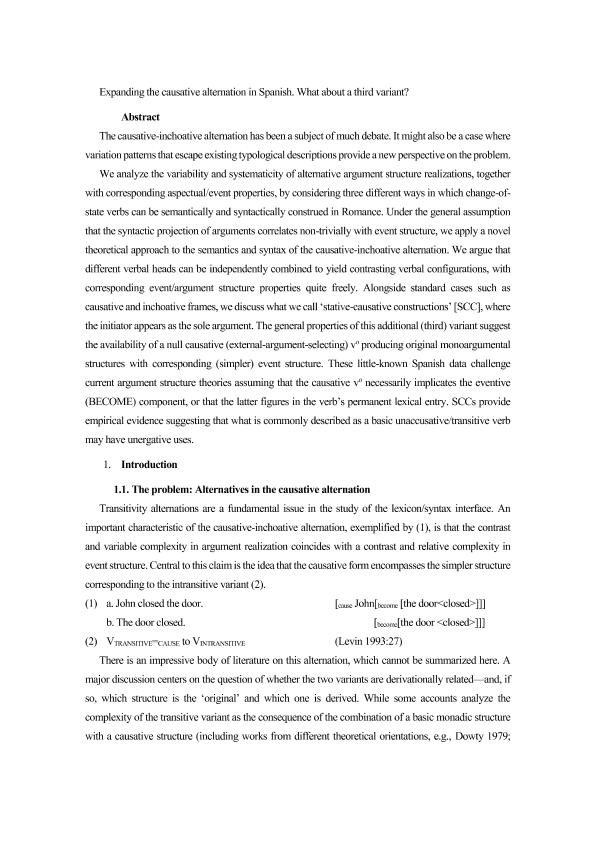Mostrar el registro sencillo del ítem
dc.contributor.author
Mangialavori Rasia, Maria Eugenia

dc.date.available
2019-06-14T19:52:41Z
dc.date.issued
2017-12
dc.identifier.citation
Mangialavori Rasia, Maria Eugenia; Expanding the causative alternation: what about a third variant?; John Benjamins Publishing Company; Belgian Journal of Linguistics; 31; 1; 12-2017; 104-135
dc.identifier.issn
0774-5141
dc.identifier.uri
http://hdl.handle.net/11336/78383
dc.description.abstract
The causative-inchoative alternation has been a subject of much debate. It might also be a case where variation patterns that escape existing typological descriptions provide a new perspective on the problem. We analyze the variability and systematicity of alternative argument structure realizations, together with corresponding aspectual/event properties, by considering three different ways in which change-of-state verbs can be semantically and syntactically construed in Romance. Under the general assumption that the syntactic projection of arguments correlates non-trivially with event structure, we apply a novel theoretical approach to the semantics and syntax of the causative-inchoative alternation. We argue that different verbal heads can be independently combined to yield contrasting verbal configurations, with corresponding event/argument structure properties quite freely. Alongside standard cases such as causative and inchoative frames, we discuss what we call 'stative-causative constructions' [SCC], where the initiator appears as the sole argument. The general properties of this additional (third) variant suggest the availability of a null causative (external-argument-selecting) v0 producing original monoargumental structures with corresponding (simpler) event structure. These little-known Spanish data challenge current argument structure theories assuming that the causative v0 necessarily implicates the eventive (BECOME) component, or that the latter figures in the verb's permanent lexical entry. SCCs provide empirical evidence suggesting that what is commonly described as a basic unaccusative/transitive verb may have unergative uses.
dc.format
application/pdf
dc.language.iso
eng
dc.publisher
John Benjamins Publishing Company
dc.rights
info:eu-repo/semantics/openAccess
dc.rights.uri
https://creativecommons.org/licenses/by/2.5/ar/
dc.subject
Argument Structure
dc.subject
Transitivity
dc.subject
Alternation
dc.subject
Unergativity
dc.subject.classification
Estudios Generales del Lenguaje

dc.subject.classification
Lengua y Literatura

dc.subject.classification
HUMANIDADES

dc.title
Expanding the causative alternation: what about a third variant?
dc.type
info:eu-repo/semantics/article
dc.type
info:ar-repo/semantics/artículo
dc.type
info:eu-repo/semantics/publishedVersion
dc.date.updated
2019-04-05T16:16:04Z
dc.identifier.eissn
1569-9676
dc.journal.volume
31
dc.journal.number
1
dc.journal.pagination
104-135
dc.journal.pais
Países Bajos

dc.journal.ciudad
Amsterdam
dc.description.fil
Fil: Mangialavori Rasia, Maria Eugenia. Universidad Nacional de Rosario. Facultad de Humanidades y Artes. Instituto de Estudios Críticos en Humanidades. Consejo Nacional de Investigaciones Científicas y Técnicas. Centro Científico Tecnológico Conicet - Rosario. Instituto de Estudios Críticos en Humanidades; Argentina
dc.journal.title
Belgian Journal of Linguistics
dc.relation.alternativeid
info:eu-repo/semantics/altIdentifier/url/https://www.jbe-platform.com/content/journals/10.1075/bjl.00005.man
dc.relation.alternativeid
info:eu-repo/semantics/altIdentifier/doi/http://dx.doi.org/10.1075/bjl.00005.man
Archivos asociados
